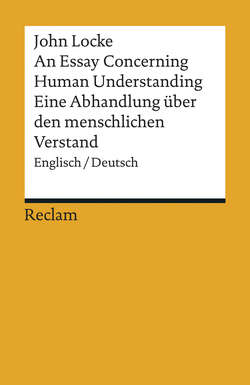Читать книгу An Essay Concerning Human Understanding / Ein Versuch über den menschlichen Verstand. Auswahlausgabe - John Locke - Страница 22
На сайте Литреса книга снята с продажи.
[172]CHAPTER XII
ОглавлениеOf Complex Ideas
§ 1. WE have hitherto considered those Ideas, in the reception whereof, the Mind is only passive, which are those simple ones received from Sensation and Reflection before-mentioned, whereof the Mind cannot make one to it self, nor have any Idea which does not wholly consist of them. But as the Mind is wholly Passive in the reception of all its simple Ideas, so it exerts several acts of its own, whereby out of its simple Ideas, as the Materials and Foundations of the rest, the other are framed. The Acts of the Mind wherein it exerts its Power over its simple Ideas are chiefly these three, 1. Combining several simple Ideas into one compound one, and thus all Complex Ideas are made. 2. The 2d. is bringing two Ideas, whether simple or complex, together; and setting them by one another, so as to take a view of them at once, without uniting them into one; by which way it gets all its Ideas of Relations. 3. The 3d. is separating them from all other Ideas that accompany them in their real existence; this is called Abstraction: And thus all its General Ideas are made. […] I shall here begin with the first of these in the consideration of Complex Ideas, and come to the other two in their due places. As simple Ideas are observed to exist in several Combinations united together; so the Mind has a Power to consider several of them united together, as one Idea; and that not only as they are united in external Objects, [174]but as it self has join’d them. Ideas thus made up of several simple ones put together, I call Complex; such as are Beauty, Gratitude, a Man, an Army, the Universe; which though complicated of various simple Ideas, or complex Ideas made up of simple ones, yet are, when the Mind pleases, considered each by it self, as one entire thing, and signified by one name.
§ 2. In this faculty of repeating and joining together its Ideas, the Mind has great power in varying and multiplying the Objects of its Thoughts, infinitely beyond what Sensation or Reflection furnished it with: […]
§ 3. Complex Ideas, however compounded and decompounded, though their number be infinite, and the variety endless, wherewith they fill, and entertain the Thoughts of Men; yet, I think, they may be all reduced under these three Heads.
1. Modes.
2. Substances.
3. Relations.
§ 4. First, Modes I call such complex Ideas, which however compounded, contain not in them the supposition of subsisting by themselves, but are considered as Dependences on, or Affections of Substances; such are the Ideas signified by the Words Triangle, Gratitude, Murther, etc. […]
§ 5. Of these Modes, there are two sorts, which deserve distinct consideration. First, There are some which are only [176]variations, or different combinations of the same simple Idea, without the mixture of any other, as a dozen, or score; which are nothing but the Ideas of so many distinct Unites added together, and these I call simple Modes, as being contained within the bounds of one simple Idea. Secondly, There are others compounded of simple Ideas of several kinds, put together to make one complex one; v. g. Beauty, consisting of a certain composition of Colour and Figure, causing delight to the Beholder; Theft, which being the concealed change of the possession of any thing, without the consent of the Proprietor, contains, as is visible, a combination of several Ideas of several kinds; and these I call mixed Modes.
§ 6. Secondly, the Ideas of Substances are such combinations of simple Ideas, as are taken to represent distinct particular things subsisting by themselves; in which the supposed, or confused Idea of Substance, such as it is, is always the first and chief. Thus if to Substance be joined the simple Idea of a certain dull whitish colour, with certain degrees of Weight, Hardness, Ductility, and Fusibility, we have the Idea of Lead; and a combination of the Ideas of a certain sort of Figure, with the powers of Motion, Thought, and Reasoning, joined to Substance, make the ordinary Idea of a Man. Now of Substances also, there are two sorts of Ideas; one of single Substances, as they exist separately, as of a Man, or a Sheep; the other of several of those put together, as an Army of Men, or Flock of Sheep: which collective Ideas of several Substances thus put together, [178]are as much each of them one single Idea, as that of a Man, or an Unite.
§ 7. Thirdly, The last sort of complex Ideas, is that we call Relation, which consists in the consideration and comparing one Idea with another: Of these several kinds we shall treat in their order.
§ 8. […] even large and abstract Ideas are derived from Sensation, or Reflection, being no other than what the Mind, by the ordinary use of its own Faculties, employed about Ideas, received from Objects of Sense, or from the Operations it observes in it self about them, may, and does attain unto. This I shall endeavour to shew in the Ideas we have of Space, Time, and Infinity, and some few other, that seem the most remote from those Originals.
